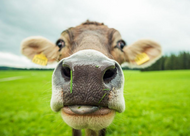Beef: GrassFed vs Grain Fed
Jan 9th 2022
“You Are What You Eat”
Perusing the grocery aisles, I am sure you’ve noticed “grass-fed” beef and other proteins. Slightly more expensive, but is it really worth it? And, what does that really mean for the human body? Let’s explore how this impacts beef itself.
There are over 1.4 billion cattle in the world. However, with this demand for the protein, not all of them are, unfortunately, fed the same. While cows prefer to eat grass and plants, that does not equal fast turnaround time for the beef-business owner. To speed this up, matured cows are put in a small stall to be fed a soy or corn based grain along with growth hormone, this helps to speed up the fattening of cattle process, which equals faster profit.
So, why should you care as a consumer of beef? Well, what a cow eats reflects the nutrients in the final product. Studies have found that in grass fed beef, monounsaturated fat is lower, concentrated with more vitamins, there are three times the amount of Omega-3s, and twice as many CLAs, or conjugated linoleic acids. However, both grass fed and grain fed beef contain similar levels of omega 6 polyunsaturated fat. How do these hurt or help you?
Monounsaturated fats are found to be lower in grass fed beef. These are also referred to as “healthy fats” and have tons of benefits. However, there are several ways to get these into your diet such as nuts and oils--the best being olive oil with over 73 grams!
Vitamins are essential for the body to thrive. When it comes to grass fed beef, it’s been found that there are more of two important vitamins, specifically– vitamin E and vitamin A. Vitamin E is found in cell membranes. This helps prevent oxidation, which can damage vital molecules, such as DNA, within the cell. Vitamin A is an essential vitamin at any age for cellular health, as well. Both of these, more important than ever to say the least.
Omega-3 fatty acids are extremely important for the body and the brain. They have been studied more than any other nutrient over time. What are some potential pros to including these in your diet?
- Combating anxiety and depression, along with other mental disorders
- Increased bone strength
- Improving vision (they make up 60% of the retina!)
- Decreased risk of certain cancer types, such as prostate
- Reduce inflammation, lowering risk for things like heart disease
- Improved inattention and reduce hyperactivity
- Enhanced sleep
Conjugated linoleic acids are actually omega 6 fatty acids! The main source of this is found in higher concentrations of grass fed cows, sheep, and goat by-products. In fact, it’s been shown to be 300-500% greater than that of grain fed animals. These particular acids have been shown over time to abet fat loss and potentially even reduce an instance of type 2 diabetes and even cancer.
Overall, paying a small amount more of money for a grass fed product is beneficial in the long term for you and your family’s health. Studies have found it to be concentrated with more vitamins and up to five hundred percent more beneficial fatty acids. In addition, it's a much more humane option to care for the animals that in turn care for us. After all, you are what you eat and the more real food you consume, the better you will feel. The animals we consume ultimately deserve that same freedom.

